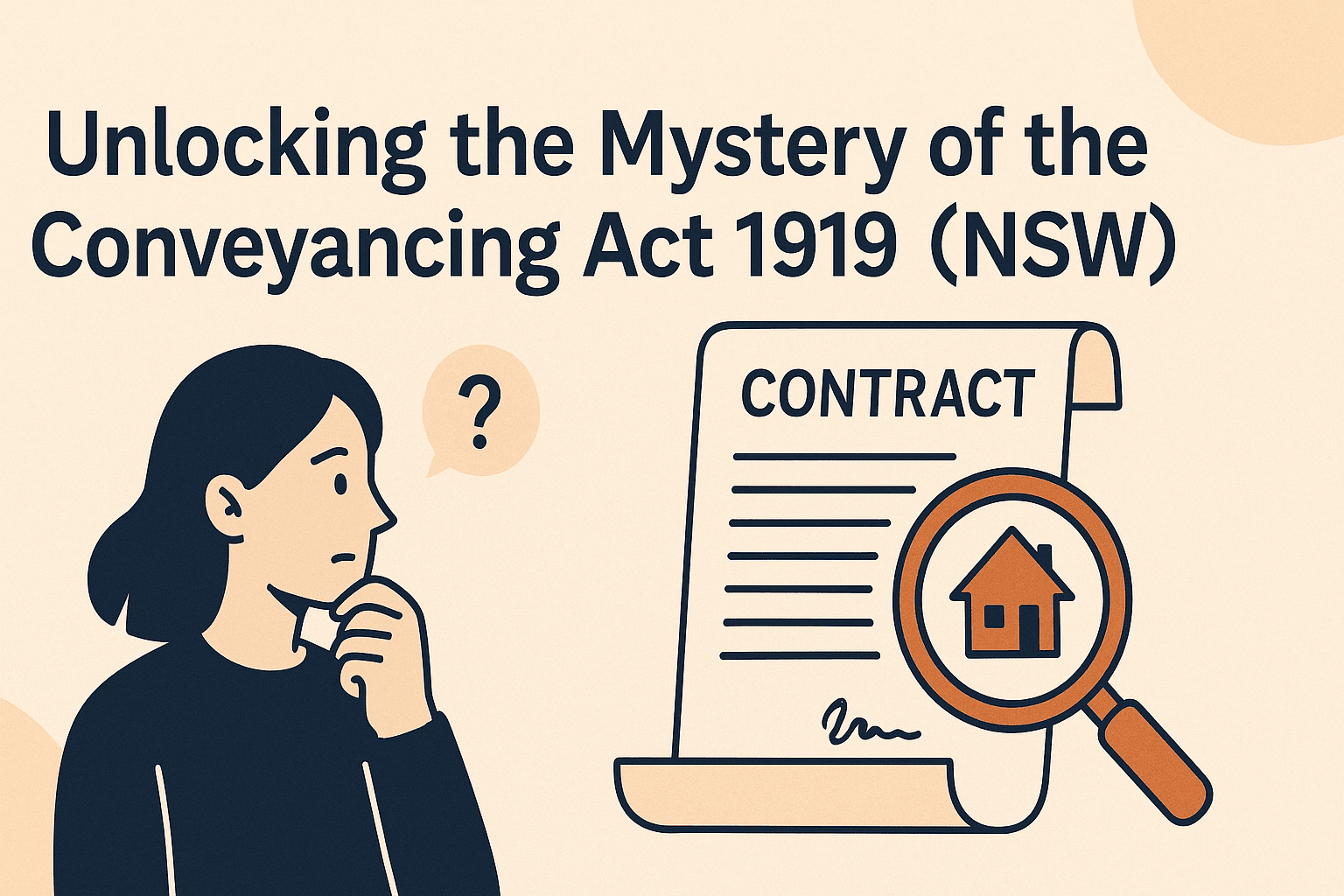Unlocking the Mystery of the Conveyancing Act 1919 (NSW)

Unlocking the Mystery of the Conveyancing Act 1919 (NSW)
Thinking of buying property in New South Wales? Congratulations!
Before you dive in, it's essential to understand the Conveyancing Act 1919 (NSW). It's the legal backbone of every property transaction in the state, designed to protect buyers and sellers alike.
This guide breaks down the Act in simple terms so you can navigate your next purchase with complete confidence.
01
The Conveyancing Act NSW sets out how property must be bought and sold. It covers contracts, cooling-off periods, disclosure requirements, and more.
Without it, the property market would be chaotic! The Act ensures fairness, transparency, and legal certainty for everyone involved.
1. Contracts for Sale
You can't just shake hands and buy a house!
A Contract for Sale must include important documents like:
Title search
Zoning certificate
Sewer diagrams
These documents give you vital information about what you’re buying.
Buyers of residential property have five business days to pull out after exchanging contracts (though a small penalty applies). This is your safety net if you get cold feet or spot a red flag during inspections.
Sellers must tell you if there’s anything wrong with the property, like:
Past flooding or fires
Structural problems
Legal disputes
If they don’t, you might be able to cancel the sale.
Your Rights and Responsibilities
Sellers’ Obligations
Before listing, the seller must:
Attach all required certificates and searches to the contract
Disclose any material facts
Make sure the property matches legal descriptions
Buyer Protections
Buyers are shielded by:
The cooling-off period
The right to claim compensation for non-disclosure
Access to fair contract terms under law
1. Pre-Contract Checks
Before signing, buyers usually:
Organise building and pest inspections
Finalise their finance
Review the contract with a solicitor or conveyancer
2. Exchange of Contracts
Both parties sign identical contracts, pay a deposit (usually 10%), and the cooling-off period starts.
3. Settlement Day
Around 6 weeks later, the buyer pays the balance, the title is transferred, and keys are handed over. Time to celebrate!
Skipping a pre-purchase inspection
Signing a contract without legal advice
Misunderstanding settlement deadlines
One mistake could cost you thousands, so tread carefully.
Professional help is not just useful—it's essential.
A conveyancer or solicitor will:
Check all documents for problems
Help negotiate better contract terms
Ensure a smooth settlement process
In short, they protect your investment.
Since 2019, sellers must disclose even more, including:
Whether the home was in a bushfire or flood area
Any serious building defects
The law is constantly evolving, so staying updated matters.
FAQs About the Conveyancing Act NSW
Q1: Can I cancel a contract after signing?
A1: Yes, during the five-day cooling-off period.
Q2: What documents must sellers provide?
A2: Title search, zoning certificates, sewer diagrams, and more.
Q3: How much deposit do I need?
A3: Typically 10% of the purchase price.
Q4: Is a solicitor better than a conveyancer?
A4: Both are qualified; solicitors can offer broader legal advice.
Q5: How long does settlement usually take?
A5: Typically 6 weeks from the exchange of contracts.
Q6: Can the cooling-off period be waived?
A6: Yes, but you'll need a certificate from your solicitor.
Ready to Buy with Confidence?
Buying a property in NSW should be exciting—not overwhelming.
Understanding the Conveyancing Act NSW puts you in control, helping you protect your investment and avoid unexpected pitfalls.
When in doubt, always seek professional advice—and happy house hunting!
For official guidance, visit: https://www.ahllegal.com or get in touch with our team.




 1300 91 66 77
1300 91 66 77







 HOME
HOME


